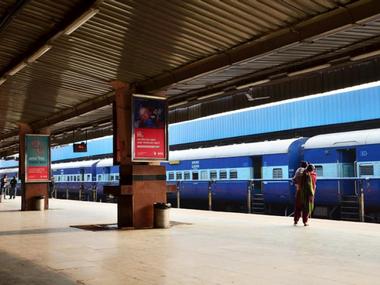Laying down the proposals for a 100-day plan, the Indian Railways appeared keen to raise the bar when it comes to efficiency, in order to cut short the travel time between the busy Delhi-Howarh and Delhi-Mumbai routes by five hours with an investment of Rs 14,000 crore in infrastructure over the next four years. In total, 11 such proposals have been made by the Railways in its 100-day plan, with instructions of immediate implementation by 31 August. The proposal has been sent to the Cabinet Committee for Economic Affairs for approval. According to the proposal document, the railways has set a target to ramp up the speed of the trains on these routes, which account for 30 percent of passenger and 20 percent of freight traffic, from the present 130 kmph to 160 kmph. [caption id=“attachment_4268281” align=“alignleft” width=“380”] Representational image. News18[/caption] Scaling down Delhi-Howrah, Delhi-Mumbai travel time by 5 hours At present, the fastest train on the
Delhi-Howrah route completes the journey within 17 hours while, on the Delhi-Mumbai route, the minimum time taken is 15.5 hours. The proposal is to bring down the travel time to 12 hours and 10 hours, respectively. The document, a part of the 100 day-plan being prepared by Union ministries on the direction of Prime Minister Narendra Modi, states that within the next 100 days approval should be obtained for projects to raise the speed to 160 kmph of the Delhi-Howrah route (1,525 kilometres) at a cost of Rs 6,684 crore and the Delhi-Mumbai route (1,483 kilometres) at Rs 6,806 crore. Railways’ ponders to invite private firms to run trains on select routes The 100-day plan also includes railways’ earlier proposal of handing over certain routes to private players to run passenger trains on low congestion and tourist routes. According to a Railway Board document, on an experimental basis, two trains may be allotted to Indian Railway Catering and Tourism Corporation (IRCTC), a subsidiary of Indian Railways. These trains will be run on routes which have “low congestion and connect important tourist spots”. Various stakeholders, including the Unions are likely to be consulted before the move is implemented. The custody of rakes will be transferred to IRCTC, which will pay annual lease charges to the railways financing arm, IRFC, The Times of India reported. The national transporter may also consider bringing in premium trains, including the Rajdhanis and Shatabdis, under this plan, for which a tender is likely to be floated within four months. Subsequently, the railways will float the expression of interests “to identify operators willing to participate in the bidding process for rights to run passenger day/overnight train sets connecting important cities,” a communication sent by railway board chairman Vinod Kumar Yadav to all members and top officials of railways on Tuesday said. In its strategy for New India in 2018, NITI Aayog too had advocated for more private participation in the railway sector, including ownership of locomotives and rolling stock, to modernising railway stations. According to
Business Standard, the planning body in its suggestions for railways said the national transporter should consider opening up the ownership and operations of freight terminals and ownership of locomotives and rolling stock to the private sector under a “transparent, neutral (non-railway) and fair regulatory mechanism”. It had cited that the move will improve performance and investment. Awareness campaign to give up railway ticket subsidy Apart from this, the railways will also launch a massive awareness campaign urging people to give up the subsidy while booking or purchasing a rail ticket. The passengers will have the option to purchase ticket with or without subsidy. The proposed campaign asking people to give up railway ticket subsidy will be on the lines of the Ujjwala campaign where people were urged to forgo the subsidy for LPG cylinders. According to the Railways, it recovers only 53 percent of the cost incurred from passenger transport business. Wi-Fi at all 6,485 railway stations Some of the other proposals include
Wi-Fi at all 6,485 railway stations including 4,882 balance stations in the next 100 days, obtaining approval for elimination by 2023 of 2,568 level crossings on golden quadrilateral diagonals with assured 100 percent funding of Rs 50,000 crore from the government, an advanced signalling system, redevelopment of 50 railways stations in 100 days and restructuring of railway board and technological revamp. Top officials to travel on trains to get first-hand information from rail passengers In a bid to get first-hand information from railway passengers, Yadav has asked all General Managers and other senior officials to travel by trains frequently. In a letter written to all the General Managers on 13 June, Yadav told them to file reports on the services provided by railways. His order came in the wake of poor quality food served in India’s first semi high-speed train Vande Bharat Express. In his letter, Yadav said: “Travelling by trains is an opportunity to gain a first hand insight on the actual conditions in respect of our services. This alone can provide us ‘moments of truth’ with our passengers and customers and equip us with invaluable knowledge to continuously innovate and improve (our) services.” Besides travelling by trains on their official tours, the General Managers, Divisional Rail Managers and unit heads were also told to inspect the condition of coaches and interact with passengers. “A part of the inspection note of the officers must invariably contain a report on the conditions of such facilities and quality of services on trains involving bio-toilets and catering,” he said. He said he expected feedback from all senior officers including corrective action taken. In the past, Indian Railways has faced flak over poor quality of food as well as choking bio-toilets. With inputs from agencies
The Indian Railways may also consider bringing in premium trains, including the Rajdhanis and Shatabdis, under this plan, for which a tender is likely to be floated within four months.
Advertisement
End of Article


)

)
)
)
)
)
)
)
)



